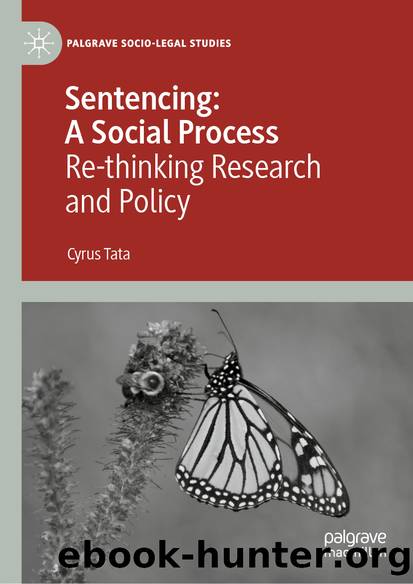Sentencing: A Social Process by Cyrus Tata

Author:Cyrus Tata
Language: eng
Format: epub
ISBN: 9783030010607
Publisher: Springer International Publishing
Thus, even attempts at bringing forward information to provide social ‘context’ to the case must focus on the individual. Most jurisdictions employ some way of providing the court with information about the character, background, family and social context of the person to be sentenced. They can only do so on an individual-by-individual basis. Such information (provided for example through pre-sentence reports 3 and pleas in mitigation) is intended to ‘humanise’ the person (Tata 2019), but can only be recognised by individualising responsibility for that context. So individuals are required to ‘own’ their problems of social exclusion.
Because professionals must restrict themselves to remedying problems on an individual-by-individual basis, the shared and collective underlying or systemic commonalities have to be ignored. Typically, this becomes a matter of diagnosing the cause of the problem according to the profession’s available remedy, which can only be centred on the individual. So the individual may be represented as selfish or self-indulgent, lacking self-discipline, self-will, or self-awareness, etc. Even courts intended to solve the problems thought to drive offending seek to a lesser or greater extent to remedy those problems through action to responsibilise the individual, requiring the person to show discipline and specific modes of rationality (e.g. Miller 2007, 2009).
Consequently, the social structural commonalities of poverty, deprivation, poor mental and physical health, limited life-chances, neglect, abuse, addictions etc. tend to be marginalised. Indeed, the humdrum, daily case-by-case recitation of these adverse conditions about individuals can tend to lead to a certain weary insouciance on the part of sentencing professionals and even a feeling of irrelevance. That should be hardly surprising and nor should we, (as so much research has a tendency to do), castigate individual professionals (e.g. Tombs and Jagger 2006; Marsh and McConville (2014); Newman 2012; Newman and Ugwudike 2014). To do so is in fact to fail to stand back from the cultural trope of the heroic individual professional who can somehow save souls from the compounding effects of disadvantage and criminal justice. The bald truth is that there is little that individual sentencing professionals can do to address these structural underlying conditions.4 Stories of poverty, deprivation, childhood neglect, abuse, social and economic marginalisation are endemic and thus rendered unremarkable. Tata (2019) observes that it can be commonplace for judges and defence lawyers to miss references to adverse personal circumstances in ‘background’ pre-sentence reports. To take one example, in the ‘education’ section of a report there is reference to the offender’s ‘learning difficulties’ and having attended ‘a special school’ and the report hints that this may have implications for his comprehension of the case:
Judge 7:
I didn’t need to know what school he went to […..]
Download
This site does not store any files on its server. We only index and link to content provided by other sites. Please contact the content providers to delete copyright contents if any and email us, we'll remove relevant links or contents immediately.
The Pirates of Somalia by Jay Bahadur(1642)
Political Theology by Carl Schmitt(1586)
The Holocaust: A New History by Laurence Rees(1529)
The Social Animal by David Brooks(1459)
A Practical Guide to International Arbitration in London by Hilary Heilbron(1441)
Restitution by Restitution(1429)
Pirates of Somalia by Jay Bahadur(1388)
Coercing Virtue by Robert H. Bork(1361)
The Nuremberg Interviews by Leon Goldensohn(1309)
Basic International Corporate Taxation by Sebastiano Garufi(1221)
A History Of Thailand by Baker Chris(1198)
International Trade and Business: Law, Policy and Ethics by Gabriël Moens & Peter Gillies(1152)
The Global Commons by Susan J. Buck(1141)
Blood Profits by Vanessa Neumann(1122)
Asian Waters by Humphrey Hawksley(1118)
The Sovereignty of Human Rights by Macklem Patrick(1115)
Spring Fever: The Illusion of Islamic Democracy by McCarthy Andrew C(1110)
The Nuremberg Trials: The Nazis and their Crimes Against Humanity by Roland Paul(1055)
Crimes Against Humanity: Historical Evolution and Contemporary Application by M. Cherif Bassiouni(1031)
